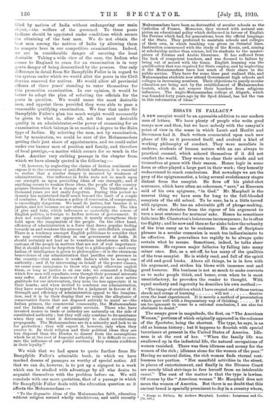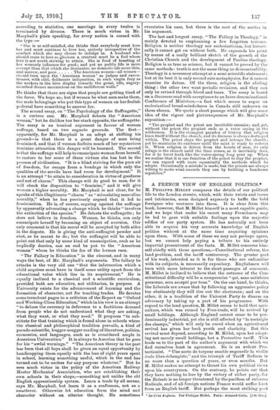ESSAYS IN FALLACY.*
A NEW essayist would be an agreeable addition to our modern men of letters. We have plenty of people who write good
essays now and then, but we have nobody with the essayist's point of view in the sense in which Lamb and Hazlitt and Stevenson had it. Such writers commented upon each new phase of life as it presented itself, and evolved a kind of working philosophy of conduct. They were moralists in undress, students of human nature with an eye always to practical counsel, which solaced themselves if it did not comfort the world. They wrote to clear their minds and set themselves at peace with their reason. Hence logic in some form or other played a large part in their work; they honestly endeavoured to reach conclusions. But nowadays we are the prey of the epigrammatist, a being several evolutionary stages distant from the essayist. He fires off his pistol-shot sentences, which have often no coherence, " save," as Emerson said of his own epigrams, " in God." Mr. Macphail is the
nearest thing we have seen for long to the full-blooded essayists of the old school. To be sure, be is a little tarred with epigram. He has an admirable gift of phrajoe-making, and he often deviates from the rigour of his argument to turn a neat sentence for neatness' sake. Hence he sometimes
falls into Mr. Chesterton's boisterous inconsequence; he is often too flighty ; and he now and then so far sinks below the urbanity of the true essay as to be cocksure. His use of Scripture phrases in a secular connexion is much too indiscriminate to be effective. He generalises too rapidly to be always quite certain what be means. Sometimes, indeed, he talks sheer nonsense. He exposes major fallacies by falling into many minor ones. But, as a set-off, he has many of the qualities of the true essayist. He is widely read, and full of the spirit of old and good books. Above all things, he is in love with his argument, and strikes his blows with immense zest and good humour. His business is not so much to make converts as to make people think, and hence, even when he is most unsatisfactory, he provokes the reader to thought. With equal modesty and ingenuity he describes his own method :-
" The image of erudition which I have created out of these various
shreds and scraps of learning will not deceive even the least experienced. It is merely a method of presentation which goes well with a fragmentary way of thinking If I am too ignorant to come to a rational conclusion, I am also tog obstinate to desist."
The essays grow in magnitude, the first, on " The American Woman," portions of which originally appeared in the columns of the Spectator, being the shortest. The type, he says, is as old as human history ; but it happens to flourish with special
luxuriance at present in the United States of America. Idle- ness is at the root of her. " When the family life was swallowed up in the industrial life, the natural occupations of women vanished. There was then idleness and money for the women of the rich ; idleness alone for the women of the poor."
Having no natural duties, the rich woman finds eternal rest. lessness her portion. " Her manifold activities in the street in places of entertainment, and finally in the Divorce Court are merely blind strivings to free herself from an intolerable
ennui." The root of the matter is that the type is lawless. Of course by the " American woman " Mr. Macphail does not mean the women of America. But there is no doubt that this ancient breed is specially prominent to-clay in a country where,
• Essays in Fallacy. By Andrew Macphail. London: Longmans and Co. Les. net.]
according to statistics, one marriage in every twelve is terminated by divorce. There is much virtue in Mr. Macphail's plain speaking, for every nation is cursed with the type :—
" She is so self-satisfied, she thinks that everybody must love her and must continue to love her, entirely irrespective of the conduct which she may choose to indulge in. A husband who should cease to love so glorious a creature must be a fool whose love is not worth striving to attain. She is fond of boasting of her womanly influence for good ; and yet no public life is more corrupt than that which she dominates, no domestic life more thin, and narrow, and poor. The American women—all women— should turn upon the American woman' as judges and execu- tioners, with cold, deliberate indignation, in such virgin fury as the workers in the hive display towards the great, idle, sugary- mouthed drones unconscious on the melliferous walls."
He thinks that there are signs that people are getting tired of the farce. We hope so; but if women be what men make them, the male belongings who put this type of woman on her foolish pedestal have something to answer for.
The second essay, on "The Psychology of the Suffragette," is a curious one. Mr. Macphail detests the " American woman," but he dislikes too her stark opposite, the suffragette.
The essay is an ironical argument in favour of woman suffrage, based on two cognate grounds. The first— apparently, for Mr. Macphail is an adept at shifting his ground—is that there is a great danger of man being feminised, and that if woman forfeits much of her mysterious feminine attraction this danger will be lessened. The second is that the suffrage will help to emancipate woman from herself, to restore to her some of those virtues she has lost in the process of civilisation. "It is a blind striving for the pure air of freedom, for escape from a bondage in which only the qualities of the servile have had room for development." It is an attempt " to attain to consideration in virtue of goodness and not of charm." This change will do good to man, for it will check the disposition to " feminise," and it will give woman a higher morality. Mr. Macphail is not clear, for he speaks of this illegitimate " charm " as " stimulating masculine morality," when he has previously argued that it led to feminisation. He is, of course, arguing against the suffrage by apparently advocating a change which he thinks " involves the extinction of the species." He detests the suffragette; he does not believe in freedom. Woman, he thinks, can only emancipate herself by becoming an object of aversion. Our only comment is that his moral will be accepted by both sides in the dispute. He is giving the anti-suffragist powder and shot, as he meant to do ; but the suffragist will be able to point out that only by some kind of emancipation, such as he impliedly decries, can an end be put to the " American woman" whom he thinks the foe of the human race.
"The Fallacy in Education" is the clearest, and in many ways the best, of Mr. Macphail's arguments. The fallacy he attacks is the very old one "that the information which a child acquires must have in itself some utility apart from the educational value which lies in its acquirement." He is equally inclined to a classical and a scientific curriculum, provided both are educative, not utilitarian, in purpose. A University exists for the advancement of learning and the formation of character, not for teaching trades. He devotes some trenchant pages to a criticism of the Report on " Oxford and Working-Class Education," which in his view is an attempt "to debase the currency in deference to a factitious demand from people who do not understand what they are asking, what they want,, or what they need." It proposes "to sub- stitute for that training which is found alone in schools where the classical and philosophical tradition prevails, a kind of pseudo-scientific, hugger-mugger reading of literature, politics, economics, and languages, such as is considered ample in American Universities." It is always to America that he goes for his "awful warnings." "The American theory in the past has been that all boys shall be given an equal opportunity by handicapping them equally with the loss of eight years spent in school, learning something useful, which in the end has turned out to he useless for any purpose whatever." But he sees much virtue in the policy of the American Railway Master Mechanics' Association, who are establishing their
own schools in their shops,—something not unlike the old English apprenticeship system. Learn a trade by all means, says Mr. Macphail, but learn it as a craftsman, not as a smatterer. Otherwise let education form the mind and character without an ulterior thought. He sometimes
overstates his case, but there is the root of the matter in his argument.
The last and longest essay, " The Fallacy in Theology," is mainly devoted to emphasising a few forgotten truisms. Religion is neither theology nor ecclesiasticism, but histori- cally it cannot get on without both. He expounds his point by means of a really brilliant sketch of the growth of the
Christian Church and the development of Pauline theology.
Religion is as true as science, but it cannot be proved by the same methods : truth is not the same thing as demonstrability. Theology is a necessary attempt at a semi-scientific statement; but at its best it is only second-rate metaphysics, for it cannot examine its datum. Of the three, religion is the abiding thing : the other two want periodic revisions, and they can only be revised through blood and tears. The essay is based on a discourse read with acceptance to an Inter-denominational Conference of Ministers,—a. fact which seems to argue an ecclesiastical broad-mindedness in Canada still unknown on these shores. We quote a short passage which will give some idea of the vigour and picturesqueness of Mr. Macphail's exposition :-
" The prophet and the priest are inevitable enemies; and, yet, without the priest the prophet ends as a, voice crying in the wilderness. It is the strangest paradox of history that religion loses itself without the church, and its fineness is always destroyed within. The priest slays the prophet and betrays the church ; yet he maintains its existence until the saint is ready to redeem it. When religion is driven from the hearts of men, its only refuge is the church until the time comes, as it inevitably does, for it to burst forth like the water-spring long pent up. When we realise that it is one function of the priest to slay the prophet, we can regard with more equanimity the methods which ho adopts. Occasionally a mistake is made, but the priests are always willing to make what amends they can by building a handsome sepulchre."







































 Previous page
Previous page